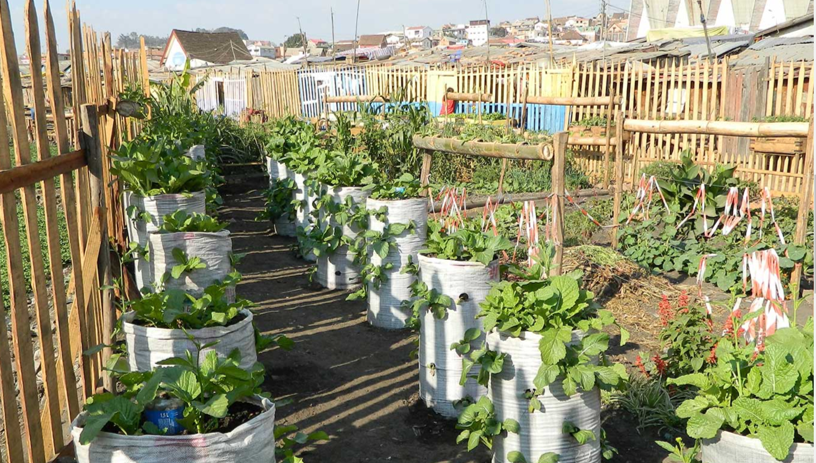Fresh vegetables for school kids in Antananarivo
Introduction
The City of Antananarivo’s Better Food for Kids program provides school children, especially those from vulnerable families, with nutritional school meals by establishing vegetable gardens in school yards. Better Food for Kids directly benefits the health and wellbeing of young people and helps to increase school retention rate and improve children’s ability to learn. The initiative is supported by the AULNA (Urban Agriculture Low Space and No Space) program, local plant nurseries and citizens.
Currently, the municipality of Antananarivo manages under its tutelage 94 public primary schools.
For two years, the municipality of Antananarivo signed the Pact of Milan and used the framework of indicators of the Pact to develop urban food policies specific to Antananarivo.
The Better Food for Kids program commenced in the canteens of public primary schools. The initiative forms part of the Mayor's five-year program entitled "Veliranon’Iarivo", the first point which addresses the "Well-being of the population".
The objectives of the program are:
- better nutrition for primary school students
- increase in school retention rate
- agricultural education for children
- health and well-being and income-generating activities for vulnerable community
- improved quality of life with economic and environmental sustainability
- social integration of vulnerable community, including participation in the waste management of the city
The municipality has adopted an integrated approach involving education, agriculture, waste management, nutrition and health. Through the AULNA method, recycled objects and materials such as drums, piping, etc, are used and repurposed into agricultural plots. Guidebooks and the use of new technology such as the creation of a mobile application will help with the learning and sharing of information about urban agriculture between the municipality and community.
The Municipality of Antananarivo is in charge of students and staff for agricultural training. It is also providing the implementation materials for the vegetable gardens in the schoolyards. In a first step, the school children are given training programs. The municipality agents are there to guide the implementation while the primary school students are participating. In a second step, trainings are offered to parents and the broader community so they can activate and maintain cultivated spaces in their locality.
The training of all stakeholders assures the sustainability of the vegetable gardens.
The initiative involves both a public-private and a public-community partnership. The Municipality has already started a public-private partnership with a company which capital will finance six showcase sites in public primary schools. While the company finances the works, the municipality helps for the technical side and the establishment of the public-community partnership.
The indicators required to assess the change are:
- number of beneficiaries,
- school drop-out rate,
- school success rate,
- harvest quantity,
- number of balanced dishes served in canteens,
- waste volume,
- quantity of recycled items used
The measurements are collected by Municipal agents, teaching staff and parents of school students. The collected data is analysed by Municipal staff to monitor the progress of the initiative.
In 2016, the initiative directly benefited 16,096 students and vulnerable families. In 2020, 6000 school children were beneficiaries of the program. In 2021-2022, the target is to reach all primary school students, a total of 50,000 children.
Waste recovery and recycling help in fertilization and implementation of the vegetable gardens. Plus, the initiative is transforming urban uncultivated spaces to gardens which provide locally produced food.
Every year, the municipality welcomes around of 50,000 children in the public primary school system, however, the dropout and failure rate is quite high due to child malnutrition.
Even though the Municipality has the human and technical resources required to support the program, the lack of funding is an obstacle. The decision was made to look for financial partners and there is a public-private partnership in place that currently supports six public primary schools. The Municipality is working towards securing more partnerships to reach the goal of including the 94 public primary schools in the program.
Educational programs on agriculture and the environment for teaching staff and the community are essential. With training, experiences and books provided by the Municipality, participants can further educate themselves in their own time. Easy access to necessary and new information is assured by the mobile application which is updated regularly.
Combining urban agriculture and waste management in food production is possible. The initiative relies on waste recovery and recycling. From organic waste, compost is made to fertilize the crops. From waste recycling, used materials (rice bag, wooden pallet, etc.) are repurposed and used as farming containers. Additionally, using small spaces in the schoolyards for short cycle agriculture contributes to provide fresh and nutritious food for canteens.
Sharing program information and the lessons learned will be possible with the mobile application that is being further developed. The Municipality is also considering hosting seminars and webinars to further expand the learnings with other communities and cities.
Urban agriculture is already present in Antananarivo (rice fields, market gardening plots, etc. see next slide), but these sites are not accessible to the most deprived population. The AULNA program has demonstrated that food production can be practiced where there is little available space and can be highly productive while improving the living environment.





Trending Discussions
From around the site...
“Absolutely interested! I'll connect via email to discuss reviewing and enhancing the Economic Analysis of Climate...”
Adaptation-related events at COP28 (all available to follow/stream online)
“Please check out these adaptation-related events taking place at COP28 - all available online (some in person too if...”
Shining a light for biodiversity – four perspectives to the life that sustains us. Four hybrid sessions.
“30 November to 19 December 2023 - Four Sessions Introduction The SDC Cluster Green is happy to invite you to the...”